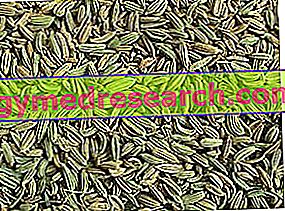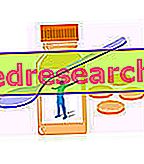What are
Fennel seeds - which actually make up the fruit of the Foeniclum vulgare Mill plant - are widely used in phytotherapy and cooking since the fourteenth century.

Cultivated fennel is an annual or biennial plant with a taproot root; it reaches 60-80cm in height and its white lump is consumed at the base (the "popular" distinction between male and female refers exclusively to the shape that the plant takes but is totally unfounded).
Nutrients and active ingredients
Fennel seeds (more correctly defined "achenes": achene means a dried fruit with a more or less hardened pericarp and that contains a single seed that is distinct from the pericarp itself) have a chemical composition rich in essential oils; the most important active ingredients are:
- Trans-anethole - (aromatic unsaturated ether) - sweet
- Fencone and Feniculina- bitter
- Anisic ketone (p-methoxyphenalacetone)
- Dipinene - (bicyclic terpene)
- Canfene - (bicyclic monoterpene) pungent odor
- Fellandrene - (unsaturated cyclic terpene hydrocarbon)
- Dipentene - (terpene hydrocarbon) pleasant lemon odor
- Methylcavic acid - (methyl ether of an allyl derivative of benzene)
- Estragole (Methyl Chavicol) - pleasant smell of anise - at high doses, POTENTIALLY CARCINOGENOUS
- Limonene - (cyclic monoterpene hydrocarbon) lemon odor
- Flavonoids
NB .: The active ingredients of fennel, if taken at high and concentrated doses, can induce hallucinogenic effects.
Health properties
The TYPICAL therapeutic application of decoctions based on fennel seeds concerns the reduction of symptoms related to digestive difficulties; hot infusion of fennel seeds (one gram of achenes per 100ml of water at 60-70 ° C for about 6-8 minutes) allows (if consumed before the meal) to take active ingredients useful for the improvement of: epigastric heaviness, drowsiness, aerophagia, hiccups, gravid vomiting, intestinal fermentation-tension and abdominal cramps.
It seems that the infusions based on fennel seeds also act effectively on diuresis and give a greater palatability of breast milk to the newborn.
Some phytotherapists claim that fennel seeds have a galactogogue effect, especially when reaching the milk supply, but there are NO studies to prove their effectiveness.
Side effects
A study published in "Food and Chemical Toxicology" directed and revised by INRAN (National Institute for Research on the Assumption of Nutrients), shows that the levels of ESTRAGOLO (carcinogenic molecule) introduced on average by consumers of decoction based on fennel seeds are excessively high; furthermore, if the consumer is in an interesting or nursing state, the transfer of estragole to the fetus or infant is inevitable. It is therefore probable that the excessive consumption (direct or indirect) of fennel seeds, and therefore of estragole, increases the carcinogenic risk for both the adult and the fetus and the infant.
Bibbliografia:
- Kaledin VI, Pakharukova MIu, Pivovarova EN, Kropachev KIu, Baginskaia NV, Vasil'eva ED, Il'nitskaia SI, Nikitenko EV, Kobzev VF, Merkulova TI - Effect of hepatocarcinogenicity of estragole on the glucocorticoid-mediated induction of liver-specific enzymes and the activity of transcription factors FOXA and HNF4 in the liver of mouse and rat- Biofizika. 2010 Mar-Apr; 55 (2): 326-35.
- Raffo, S. Nicoli, C. Leclercq - Quantification of estragole in fennel herbal teas: implications on the assessment of dietary exposure to estragole - National Research Institute for Food and Nutrition (Inran), via Ardeatina 546, 00178 Rome, Italy
- New dictionary of applied commodity and chemistry. Volume 1- Villavecchia Eigenman - Hoepli.



